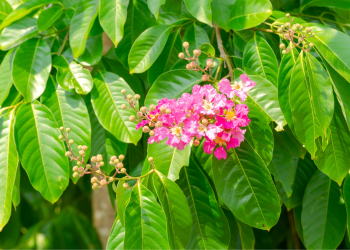🌿 Banaba Leaves, a traditional herbal remedy with growing popularity in modern wellness, especially for blood sugar regulation:

Botanical Name: Lagerstroemia speciosa
Common Names: Banaba, Queen’s Crape Myrtle, Pride of India
Family: Lythraceae
Native To: Southeast Asia (especially the Philippines, India, and Malaysia)
Part Used: Primarily the leaves, sometimes bark and flowers
🌱 Plant Description
- Type: Tropical flowering tree
- Height: Up to 20–30 feet
- Leaves: Oval, smooth-edged, green turning red in autumn
- Flowers: Bright purple or pinkish-lavender clusters
- Traditional Use: Used in Philippine and Indian folk medicine for diabetes and weight loss
🔬 Key Active Compounds
- Corosolic Acid – Key triterpenoid known to:
- Support insulin sensitivity
- Enhance cellular glucose uptake
- Reduce blood sugar spikes
- Ellagitannins – Antioxidants with anti-inflammatory and antimicrobial benefits
- Flavonoids & Lagerstroemin – Aid in metabolic regulation
💊 Health Benefits of Banaba Leaves
| Health Focus | Benefit |
|---|---|
| Blood Sugar Control | Lowers post-meal glucose; supports insulin function |
| Weight Management | Aids in fat metabolism and appetite control |
| Antioxidant Support | Protects cells from oxidative stress |
| Cardiovascular Health | May help reduce cholesterol and blood pressure |
| Anti-inflammatory | Useful in metabolic syndrome and chronic inflammation |
🌼 Ayurvedic Perspective
Though not a classical Ayurvedic herb, Banaba’s properties closely align with herbs used for:
- Madhumeha (diabetes)
- Medoroga (obesity or fat disorders)
- Agni Deepana (enhancing digestion and metabolism)
It may be paired with Gudmar (Gymnema), Karela (Bitter Melon), or Neem in herbal formulations for metabolic health.
🧪 Common Forms of Use
- Tea (Banaba Leaf Tea) – Traditional and popular
- Capsules or Tablets – Often standardized to contain 1–2% Corosolic Acid
- Powder (Churna) – Used in blends or decoctions
- Extracts – Tincture or fluid extracts for therapeutic formulations
⚠️ Precautions
- May enhance the effect of diabetic medications – monitor blood sugar
- Should be used with caution in hypoglycemia
- Avoid during pregnancy or lactation unless supervised
- Generally safe and well-tolerated when used correctly
